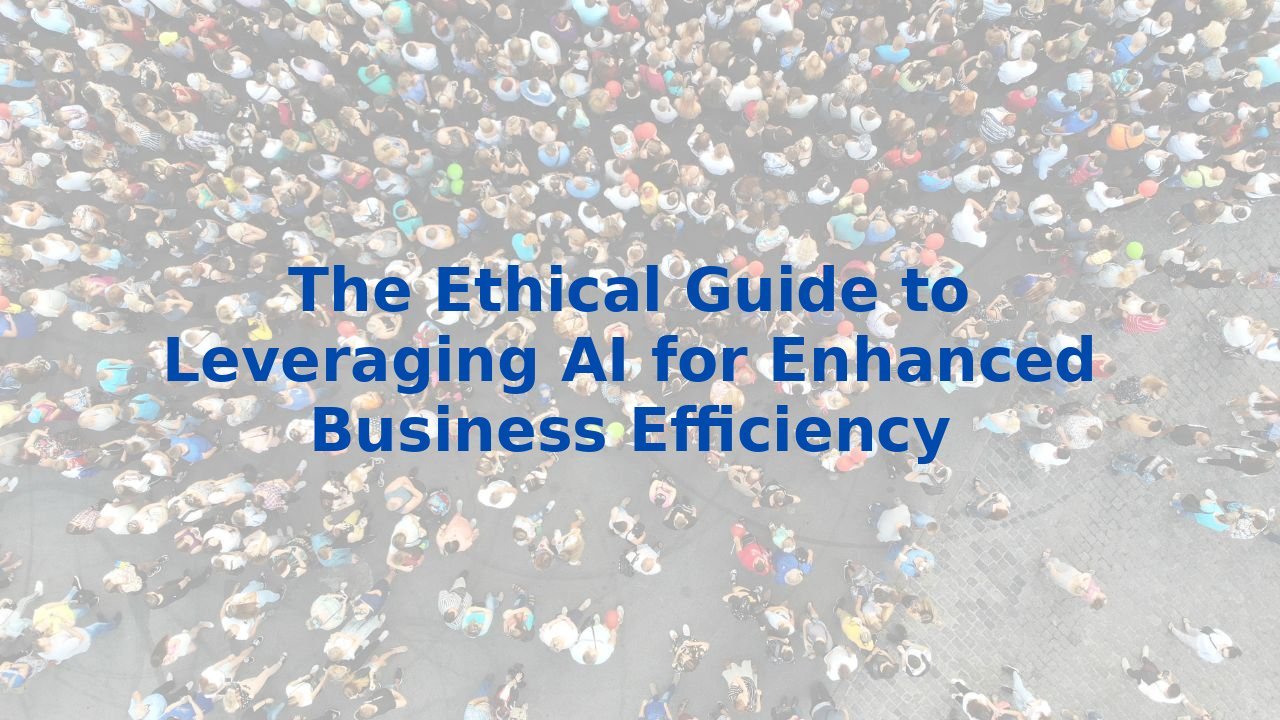The Ethical Guide to Leveraging AI for Enhanced Business Efficiency
The Ethical Guide to Leveraging AI for Enhanced Business Efficiency
In the fast-evolving landscape of business, efficiency is no longer a luxury; it is an absolute necessity. Artificial Intelligence (AI) has emerged as a transformative force, capable of reshaping how organizations operate. The true power of AI lies not just in automating processes, but in empowering employees and enhancing decision-making through ethical practices. This guide dives into the business processes that AI can enhance, illustrating its potential benefits while emphasizing the importance of training your workforce.
Enhancing Business Processes with AI
Process Discovery
AI employs advanced techniques such as process mining and natural language processing to unveil existing business processes. This technological capability identifies inefficiencies hidden within the organizational fabric.
Benefits: By automating the discovery of processes, businesses can save valuable time and resources. AI quickly brings to light areas requiring immediate attention, paving the way for a leaner operational model.
Process Mapping
Real-time data analysis powered by AI equips process analysts with accurate, up-to-date process maps. This dynamic depiction of business processes ensures organizations are grounded in reality.
Benefits: Enhanced accuracy in documentation minimizes the risk of outdated information, allowing organizations to make informed decisions swiftly and confidently.
Process Automation
Automation of manual tasks through AI robots can significantly elevate efficiency. From data entry to document processing, these bots take over mundane tasks traditionally performed by humans.
Benefits: With automation reducing the potential for human errors, companies experience increased productivity levels, allowing teams to invest time and energy into strategic initiatives that drive innovation.
Process Management
AI's capability to continuously monitor processes provides organizations with a proactive solution to handle potential operational issues. By leveraging historical data, businesses are alerted to problems before they escalate.
Benefits: This real-time approach fosters agility, enabling quicker responses to market shifts and internal challenges, enhancing overall resilience.
Process Improvement
AI aids in driving improvements through data-driven insights and predictive modeling. This capability allows companies to adapt dynamically and respond competitively to their environments.
Benefits: Empowered by actionable insights, organizations can implement changes that yield long-lasting success while fostering a culture of continuous innovation.
Enhancing Decision-Making with AI
Data Analysis
AI's rapid data analysis capabilities facilitate uncovering trends and predicting outcomes with remarkable efficiency.
Benefits: These insights promote data-informed decision-making, paving the way for strategic moves supported by reliable analytics.
Predictive Modeling
With the ability to simulate various scenarios, AI aids organizations in predicting the impacts of different strategies on key performance indicators.
Benefits: This foresight enables businesses to price products optimally, mitigate risks, and increase profitability without the need for excessive trial and error.
Automating Manual Tasks
The automation of repetitive tasks, such as document processing, allows organizations to free up human resources for tasks that require higher-level thinking and creativity.
Benefits: This shift in focus results in a workforce better able to drive innovation and engage in activities that truly add value.
The Role of Employee Training in AI Adoption
While the capabilities of AI are transformative, the effective integration of AI technologies into business processes hinges on the readiness of employees. Training is paramount for maximizing AI’s potential. Here’s why:
Understanding AI Capabilities
Employees must grasp the fundamentals of AI, which will empower them to seamlessly integrate these technologies into their roles, leading to enhanced productivity.
Data Interpretation
Training should extend beyond basic AI functionalities. Employees must be skilled in interpreting AI-generated data and insights to make decisions that positively impact the organization.
Process Optimization
Acquiring the skills to use AI tools effectively helps employees identify and implement improvements, fostering a culture of optimization within the organization.
Continuous Learning
As technology continues to advance, organizations thrive when their workforce remains committed to continual skill development and adaptability.
Ultimately, the intertwining of ethical business practices, truth, and AI can produce staggering results for organizations. An emphasis on employee training fosters a culture of informed decision-making, innovation, and sustainable growth. By embedding AI strategically into business processes, companies not only enhance operational efficiency but also empower their workforce.
In a world where competitive advantage is dictated by speed and adaptability, embracing AI as a partner, rather than a replacement, transforms the narrative of business efficiency.



